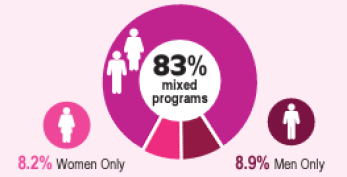

Applying interventions designed to reduce and manage the symptoms of substance use disorders.
The National Institute on Drug Abuse (NIDA) has released a new report Recommendations for NIDA's Cannabis Policy Research Agenda.
The document has been prepared by the National Advisory Council on Drug Abuse Workgroup which was formed...
In drug addiction, cues previously associated with drug use can produce craving and frequently trigger the resumption of drug taking in individuals vulnerable to relapse. Environmental stimuli associated with drugs or natural reinforcers...
Estimates show that in the UK the social and economic costs of alcohol related harm amount to £21.5bn, while harm from illicit drug use costs £10.7bn. These include costs associated with deaths, the NHS, crime and, in the case of alcohol...
This Pocket Guide was summarized Guide 34 pages of the NIAAA, helping patients who drink too much: A guide clinical. Materials include:
Guide aimed at professionals of health to work with people from drinking alcohol in excess
This guide has been written for primary care health and mental health professionals. It has been produced by the National Institute on the Alcohol...
Introduction: Descriptive data about co-occurrence of alcohol and cocaine consumption is scarce, despite its important prevalence. Dual disorders show high prevalence in clinical samples, and patients report worse evolution and...
Mentor UK, an organisation focused on drug prevention and education, have launched a Quality Mark for alcohol and drugs education.
The quality mark has been developed in addition to a set of developmental quality standards for schools...
Researchers from the University of Sheffield have investigated UK drinker's decision making. This research examines public knowledge and use of UK drinking guidelines exploring a representative sample of the English population.
Published...
The Canadian Institute for Substance Use Research at the University of Victoria have released The International Model of Alcohol Harms and Policies.
Comprising of a set of guidelines, methods, and tools this resource was produced with...
Substance use is a major cause of disability globally. This has been recognized in the recent United Nations Sustainable Development Goals (SDGs), in which treatment coverage for substance use disorders is identified as one of...
For anyone interested in digital health behaviour interventions this manual from SAMHSA will prove interesting. Exploring how technology-assisted care can be implemented, the value of technology based assessments and the ways in which the...
Time to consolidate the lessons of the five cells in row 2 of the Drug Treatment Matrix. Whether medical or psychosocial, if you work in/with treatment, this is your chance to lift your eyes from the workbench and reconsider what it’s all...
Opioid use and overdose rates have risen to epidemic levels in the United States during the past decade. Fortunately, there are effective medications (i.e. methadone, buprenorphine, and oral and injectable naltrexone) available...
Contingency management (CM) has recently shown efficacy in promoting abstinence and retention in treatment among crack cocaine users in Brazil. However, partially because of unawareness and resistance among health...
Updating the previous year’s “really brilliant analysis” (Professor Susanne MacGregor, London School of Hygiene and Tropical Medicine), our analysis of the performance of England’s drug and alcohol treatment system up to 2016/17. With the...
Background: Only 29% of cannabis dependent individuals seek treatment, yet significant decreases in cannabis use are seen in 31-36% of individuals that seek treatment. Follow-up studies have found that over 60% in substance use...
Background: In Portugal, as far as we know, there are no recent studies that evaluated the comparative efficacy of therapeutic modalities in addiction problems by reference to a holistic and psychosocial model of effectiveness. ...
The Addiction Technology Transfer Center (ATTC) Network is an international, multidisciplinary resource for professionals in the addictions treatment and recovery services field. The ATTC has been working since 1993 to improve the clinical...
Introduction:
Tobacco use disorder is critical among people aged 16 to 25 years. College campuses are prime locations for smoking cessation interventions for young adults. The vast majority of the smoking research with college...
Share the Knowledge: ISSUP members can post in the Knowledge Share – Sign in or become a member